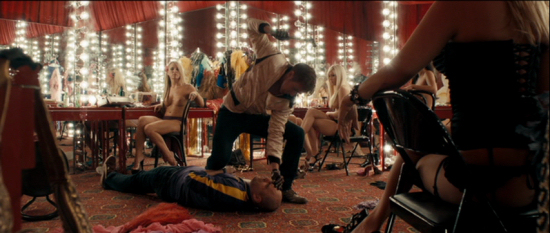The Car Not Seen

It occurred to me last night one could put together a pretty dynamite Carey Mulligan triple feature with Never Let Me Go, "Blink", and Drive. Earlier in the week I heard Richard Roeper mention on The Nick and Artie Show that he'd put Drive at number one for his top ten list of the year. He's far from alone--the movie appears on nearly every top ten movies list I've seen for 2011, often at number one. I waver between Drive and Melancholia for the number one movie, but there's no question the disparity between the Academy's choice for best picture and the year's actually best picture hasn't been so great since Brokeback Mountain lost to the Paul Haggis version of Crash, and at least Brokeback Mountain was nominated.
I find myself thinking quite a bit about how The Artist is not about an artist. I mean, Valentin, the main character of The Artist, is an artist insofar as he's a performer, but the movie's not about his ability to create art or his passion for it, it's about his pride and his love for the female lead. Drive, meanwhile, is about a guy who has no interest in some mob money he comes across. I sort of wonder if this difference between the movies is reflective of the Academy being influenced by sentimentality and greed.
I finished The Birth of Tragedy a few days ago and it's caused me to re-examine my definition of art. In the past I've said I felt art is any abstract thing constructed by someone or a group of people with the intention of having an effect on an audience. This definition includes artists who create for themselves, in which scenario the artist is also the audience. I don't feel the word "art" implies, as many people do, something good. I think a bad movie, for example, is still art, just bad art.
Nietzsche explicitly says art must have both Apollonian and Dionysian qualities, and he seems to feel that many plays and other media have neither. He presents the mode of thought introduced by Socrates that holds reason as the best goal in art and all other things as the thing that destroys both the Apollonian and the Dionysian. Though he also discusses the fact that art seems to emerge in places seemingly by accident from the works of Socratic writers. I think what he's talking about are the inevitably imperfect and subjective perceptions of reality that must creep into a writer's work. I'd say there's an inherent danger when people mix up their myths and their reason. You get things like Creationism, for example.
So I would say there may be as much value in approaching science with reason and art without it.
While I continue to say bad art exists, I find myself sympathising strongly with Nietzsche's argument that art is essential and a wonderful aspect of human culture. And it is hard to explain why, though I would say part of this genie's appeal is that he can't really be bottled.
